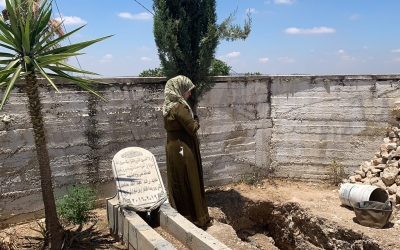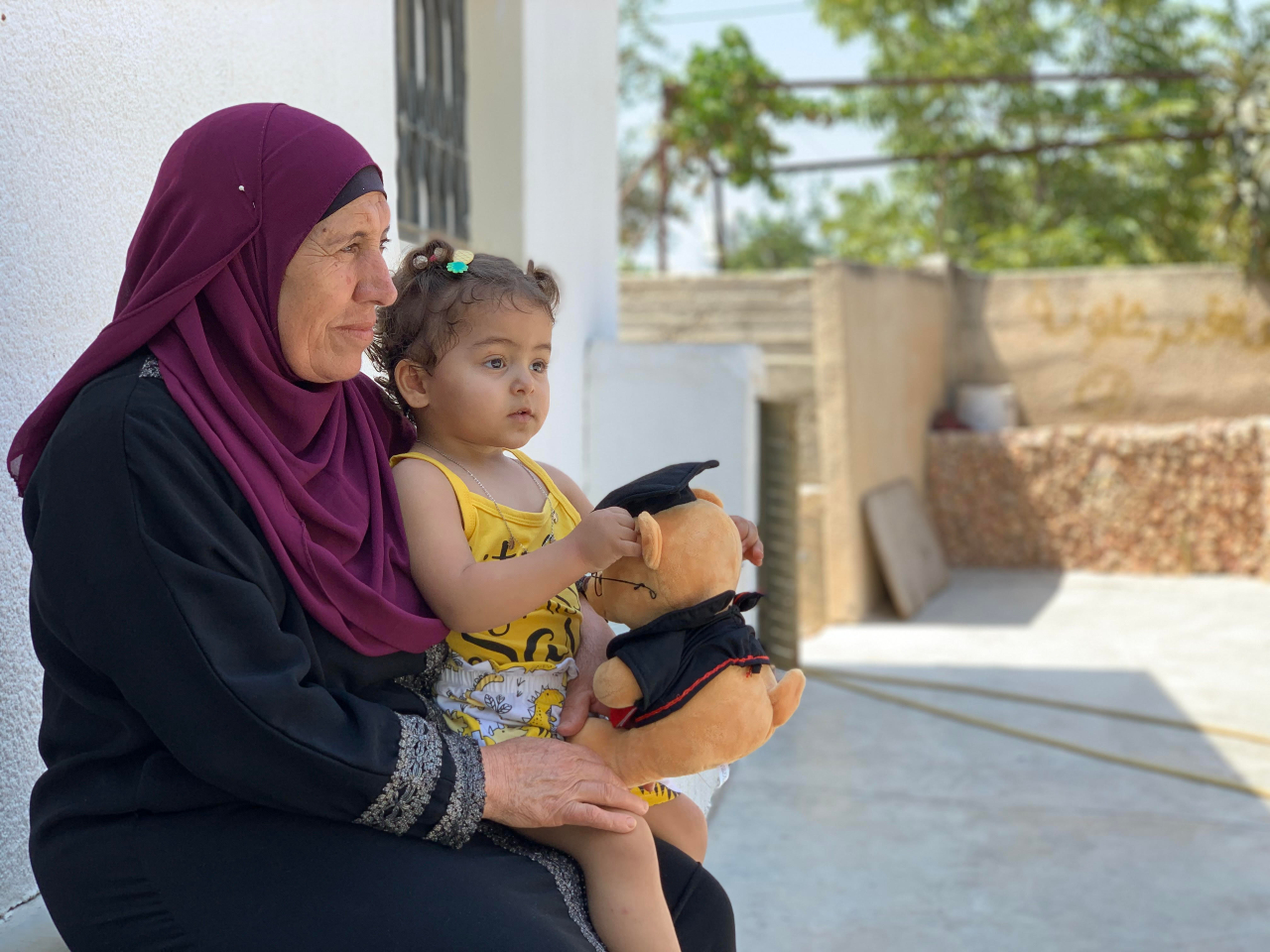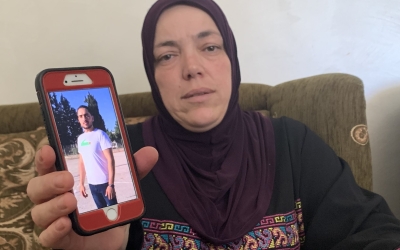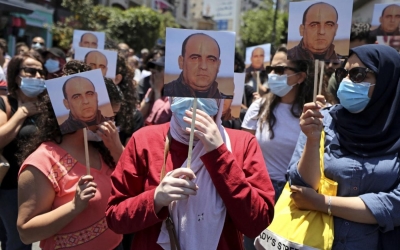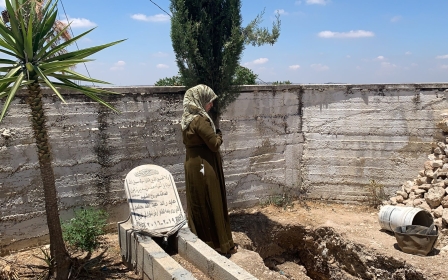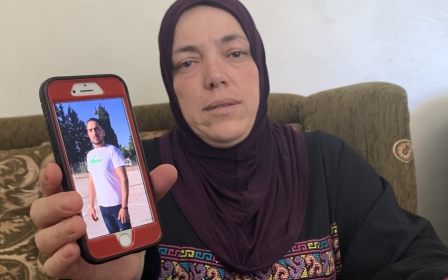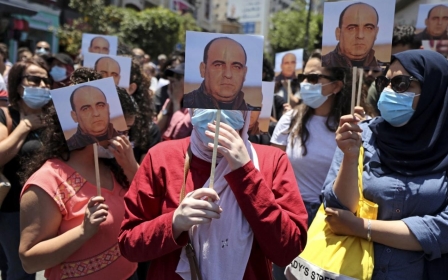'Alone and handcuffed': Palestinian mother fears giving birth inside Israeli prison
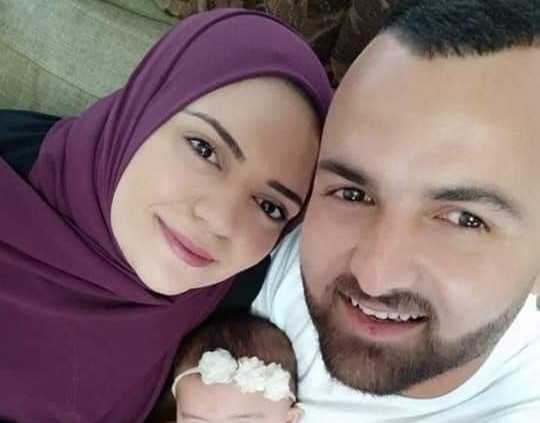
Anhar al-Deek, 25, is approaching her due date, but unlike most mothers, Anhar fears the birth of her child. She feels it is safer that he stays inside her womb than behind bars in the Israeli prison where she is being held, where she feels nothing but fear and anxiety.
The Israeli army arrested Anhar from the village of Kufr Nima, west of Ramallah city, while she was on her family’s farmlands on 8 March.
Officers accused her of attempting to carry out a stabbing attack. Courts in Israel have not issued a ruling in her family’s appeal to have her released, ignoring the fact that she is pregnant and suffering from complications.
Anhar managed to leak a letter to her family through another female prisoner who had recently been released. Expressing her fear of going through the process of giving birth far from her family, she wrote: "What shall I do if I was born far from you, and was handcuffed while I was giving birth?
"You know how [difficult] a caesarean delivery is... Imagine it in prison, alone and handcuffed.”
Anhar’s mother, 57-year-old Aisha, now spends her time looking after her one-and-a half-year-old granddaughter Julia.
"She wakes up at night calling for her mother, and does not find her mother near her," said Aisha.
"What hurts me the most is that she sometimes calls me 'mama', or calls any woman in the family 'mama'.”
Beaten while pregnant
At the time of Anhar’s arrest, Aisha told MEE that her daughter had gone out for a walk on the family’s land on Raysan hill, and was suffering from depression as a result of her pregnancy.
A group of Israeli soldiers attacked her there, and accused her of trying to stab them.
“Anhar told us that they beat her severely during her arrest, even though she was shouting that she was pregnant, but they didn’t care,” continued Aisha.
Immediately after her arrest, Anhar was taken to HaSharon Prison, where she was subjected to a month-long interrogation and placed in solitary confinement.
Anhar told her lawyers that she was kept under harsh conditions and subjected to long hours of interrogation, with no consideration of her physical and psychological state.
"Anhar was subjected to severe torture for a month, after which she was transferred to Damon prison, where female prisoners are living in difficult conditions,” said Aisha, adding that Anhar cannot sleep due to the lack of a sufficient mattress.
She said her daughter suffers from severe pain in her pelvis and feet, as well as general fatigue.
Solitary confinement
During her first pregnancy - with Julia - Aisha did not leave her daughter Anhar, particularly in her final month. She accompanied Anhar during her birth and looked after her constantly.
This time, however, Aisha is living in fear and anxiety over being unable to do anything for her daughter.
“Anhar told us in her letter that she did not know how she would wake up from the birth without her mother and husband by her side," said Aisha.
"She also thinks a lot about how she will be shackled to the bed.”
The Israeli prison administration informed Anhar that after giving birth that she and her baby will be placed in solitary confinement as a precaution against transmitting the coronavirus to others after returning from the hospital.
"It worries me a lot how the other female prisoners will not be able to take care of Anhar. Anhar and her child will be alone in the cell,” said Aisha.
'Role model'
In 1972, Palestinian prisoner Zakiya Shammout gave birth to the first child in an Israeli prison.
Anhar will name her son ‘Alaa. He will be the ninth Palestinian baby to suffer the same fate.
In a short report, the official Palestinian news agency Wafa documented the experiences of seven female prisoners who gave birth in prison, finding that they had all suffered, particularly as their arms and legs were chained to the bed during labour and the birth.
'Anhar is today a role model not for the suffering of prisoners, but for the suffering of Palestinian women'
- Anhar al-Deek’s sister Amna
Anhar’s sister Amna told MEE that the most she has been able to do for her sister is to organise campaigns on social media and contact human rights organisations and media outlets to bring attention to her sister’s case.
"Today we are asking many questions about the role of women's and human rights groups in supporting Palestinian women in the face of Israeli attacks, persecution and the great injustices they are subjected to,” said Amna.
"Anhar is today a role model not for the suffering of prisoners, but for the suffering of Palestinian women.”
Amna said her greatest fear for Anhar comes from the bouts of depression she is suffering from, and the likelihood of her enduring further trauma from postpartum, a reality that would be heightened in prison.
Voice messages
Since her arrest, Anhar has been allowed only one family visit, by her husband, while her mother and sister have been unable to see her since her arrest almost six months ago.
She is also prevented from speaking to her family over the phone. Anhar's mother said that the Israeli army also withdrew Anhar's husband’s work permit for accessing the 1948-occupied areas, as additional punishment for the family.
"I haven't been able to see her until now, and have only heard her voice once, but we send her voice messages about her baby daughter Julia through one of the local radio stations that she can hear,” said Aisha.
“Anhar told us to stop letting Julia call out to her over the radio; she is unable to comprehend that her daughter is growing up, away from her.”
Anhar is one of 11 Palestinian mothers imprisoned in Israeli jails, out of a total of 40 female prisoners. The majority are held in Damon prison under harsh and abusive conditions, according to the Palestinian Prisoners Club.
The organisation said in a statement that when the Israeli prison administration allows children to visit they are prevented from hugging their mothers - a situation that has worsened with the spread of Covid-19 and a lack of regular family visits.
Middle East Eye delivers independent and unrivalled coverage and analysis of the Middle East, North Africa and beyond. To learn more about republishing this content and the associated fees, please fill out this form. More about MEE can be found here.


